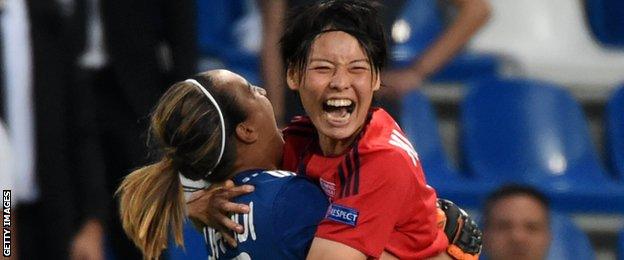Women's Super League to switch to winter season in 2017
- Published

Chelsea Ladies are the current holders of the Women's Super League One title
The Women's Super League will be played through the winter in 2017-18, the Football Association has announced.
The WSL, in its sixth year, takes place in the English summer, with the 2016 season having started on 23 March.
The 2017-18 WSL will run from September to May after Women's Euro 2017, moving in line with other divisions in Europe.
The FA says it hopes the changes will help England win the 2023 World Cup, improve player welfare and double both participation and attendances.
England manager Mark Sampson described the move as "courageous" but thinks it will take the game forward.
"When I look at it the positives far outweigh the negatives, certainly from an England point of view," the 33-year-old said.

England won bronze at the 2015 World Cup
"The objective is to make sure we do as well as we can. We need the best players we can, the best support and with a fixture list that helps them develop and grow.
"Hopefully the way the season works moving forward, we will get players who are fit, they will be fresh and with all of the factors combined it gives us a better chance of a more competitive team."
A one-off, transitional competition, known as the FA WSL Spring Series, will run from February to June in 2017, alongside the Women's FA Cup, as part of the changes.
The FA has also revealed the WSL will take a one-month winter break from mid-December 2017 to mid-January 2018.
The Women's Premier League divisions - which include the third tier of women's football and below - are already played over the winter.
The WSL had planned to expand to 20 clubs by 2017, with no teams being relegated from WSL 2 to the WPL. That will continue, to 21 teams by 2017-18.
The new WSL schedule for 2017-18 |
|---|
Starts: September 2017 |
Winter break: Mid-December to mid-January |
Ends: May 2018 |
10 clubs in WSL 1 and 11 clubs in WSL 2 |
Being competitive in Europe
The summer schedule had been criticised by leading figures in the English game, including Chelsea Ladies manager Emma Hayes, for its impact on English clubs competing in Europe.
Speaking after a 2-1 loss in the first leg of her side's Champions League last-16 tie against German side Wolfsburg in November 2015, Hayes told BBC Sport: "Four weeks between games showed.
"I hope our Football Association do more to prepare better scheduling because if an English team is going to win the Champions League, we have to be more game ready.

Saki Kumagai (right) scored the winning penalty as Lyon beat Wolfsburg in the 2016 Women's Champions League final
"It's geared to French, German and Swedish teams, and until we change that or listen to clubs like Chelsea we are always going to get knocked out in the early rounds."
The Women's Champions League runs alongside the men's competition, with the 2016-17 final to be played in Cardiff on 1 June.
In 2014-15, Bristol Academy reached the quarter-finals of the competition, only to lose 12-0 on aggregate to Frankfurt in a March tie that came before Bristol had started their 2015 league campaign.
How will the one-off WSL Spring Series work?
As the league switches from a summer schedule to winter, the WSL Spring series removes the prospect of a 10-month period without competitive matches for WSL teams.
Clubs will play each other just once between February and June, before England head to the Netherlands for Women's Euro 2017.
Fixtures will start in the same month in which WSL 2 clubs have typically entered the Women's FA Cup.
Trophies will be awarded to both divisional winners, but there will be no promotion or relegation.

Current WSL 1 leaders Manchester City Women play their home matches at the Academy Stadium
Will attendances be affected?
Attendances in WSL 1 saw an overall rise of 48% in the 2015 season compared to 2014, with record crowds after England came third at the World Cup in Canada.
Manchester City Women were watched by the highest average crowd of 1,500.
Whether WSL clubs playing matches on the same days as their male counterparts would see an increase or decrease in attendances remains to be seen.
The 2015 and 2016 Women's FA Cup finals both saw record competition crowds at Wembley, with Arsenal beating Chelsea 1-0 in May this year in front of 32,912 people.
- Published10 July 2016

- Published14 May 2016

- Published20 June 2016

- Published7 June 2019
